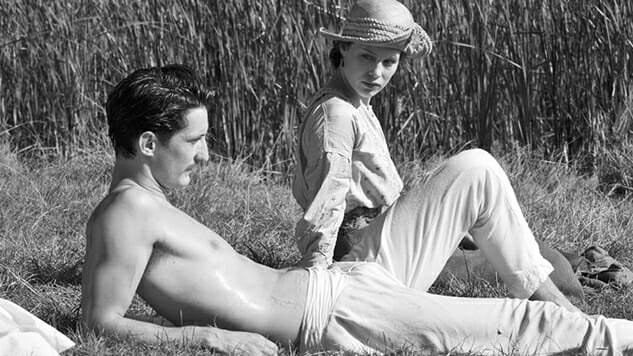
If nothing else, Frantz will hopefully bring to a wider audience an awareness of an unjustly neglected piece of cinema history. François Ozon’s latest film is a reworking of Broken Lullaby, a 1932 film by Ernst Lubitsch that is easily the legendary German-American filmmaker’s most uncharacteristic project. It’s also his most sorely underrated: Whereas much of Lubitsch’s oeuvre consists of screwball comedies with a penchant for sexual innuendo and, on occasion, some sharply political commentary, Broken Lullaby—based on a stage drama by Maurice Rostand—plays its post-World War I pacifist melodrama absolutely straight, and the result is sublime in the way the best melodramas are. It’s utterly unafraid to tap into direct emotion in the same way Lubitsch proved fearless in pushing the boundaries of taste and sophistication in his other films.
The ever-eclectic Ozon is a soberer dramatist than Lubitsch, less interested in going for the emotional fireworks the latter brought to his film. Thus, his version has more of a prestige-movie feel, a throwback to the “Tradition of Quality” productions of French cinema’s pre-French New Wave past, with their immaculate production values and fairly discreet emotionalism. Ozon does introduce one mildly imaginative visual touch in Frantz: Though much of the film is shot (by cinematographer Pascal Marti) in black-and-white, the film occasionally shifts into color when either one of the two main characters—guilt-ridden Frenchman Adrien Rivoire (Pierre Niney) and Anna (Paula Beer), the fiancée of Frantz, a German soldier whose death Adrien witnessed on the battlefield—reminisces about happier times.
Otherwise, Frantz is a very character- and narrative-driven. It’s a tribute to the primal power of the story it tells, though, that the film is as affecting as it is, even when its grip slightly slackens in its second half, during which Ozon introduces his most substantial changes to the story told in Broken Lullaby. Lubitsch’s film was led by the guilt-ridden French soldier, who dared to venture into Germany in order to meet the family of a now-dead enemy soldier he knew in battle, as well as the soldier’s fiancée. Ozon, however, shifts the focus to the fiancée—Anna rather than Adrien is the person we see in Frantz’s first scene, and her perspective dominates the film, especially throughout the second half. There, Ozon and co-screenwriter Philippe Piazzo extend Broken Lullaby’s narrative by inverting it, making Anna venture into Adrien’s home turf, the enemy nation of France.
There’s just a hint of the film’s schematics through the surface of its second half. Some of the similarities between Anna’s experience in France and Adrien’s experience in Germany feel a bit too tidy, and Ozon’s even-keeled tone doesn’t mitigate the faint sense of seeing a kind of mathematical proof play out. As a result, its ending—in which Anna finds strength from a favorite Edouard Manet painting of Adrien’s to move on in her life from the death of her fiancé—doesn’t have quite the inspirational, gut-punch impact it ought to.
Nevertheless, two core ideas propel our emotional involvement in Frantz throughout. One is a subversive view of lies as a sometimes necessary evil to bring comfort to those experiencing emotional trauma. Adrien’s sincere desire for some kind of absolution from the German soldier’s family is satisfied by a deception on his part (the nature of which won’t be revealed here, though if you know Broken Lullaby, you can guess it about 10 minutes in). So too does deception fuel Anna’s search for Adrien in France, as she’s encouraged by Frantz’s parents, who are ignorant of a crucial fact about Adrien that Anna already knows but has decided to keep under wraps for the sake of their well-being. A key scene in the film’s second half, in which a priest forgives Anna for lies she has told Frantz’s parents because of the well-meaning spirit in which she has committed these sins, articulates (perhaps too directly) Ozon’s view on the matter.
Perhaps most important of Ozon’s worldview is the film’s universal humanism. Adrien’s risky desire to bridge the cultural gap between former enemies on the battlefield speaks to a sense of shared humanity that remains as crucial as ever to the survival of our species. Naturally, that sense of brotherhood can be excruciatingly difficult to summon up after the brutalities of wartime, a bitter truth Lubitsch and Ozon are hardly blind to. But the beauty of Broken Lullaby, and to a slightly lesser but still potent extent, Frantz, is its sheer, unironic belief in the necessity of continuing to share such bonds.
Director: François Ozon
Writers: François Ozon, Philippe Piazzo
Starring: Pierre Niney, Paula Beer, Ernst Stötzner, Marie Gruber, Johann von Bülow, Anton von Lucke
Release Date: March 15, 2017
Kenji Fujishima is a freelance film critic, contributing to Slant Magazine, Brooklyn Magazine, The Playlist and The Village Voice. He was also Deputy Editor of Movie Mezzanine. When he’s not watching movies and writing and editing film criticism, he’s trying to absorb as much music, art, and literature as possible. He has not infrequently been called a “culture vulture” for that reason.